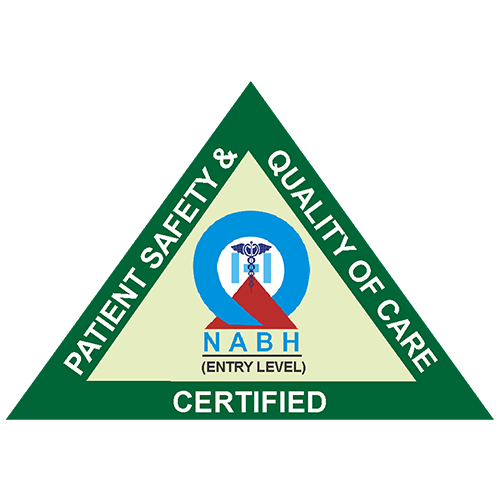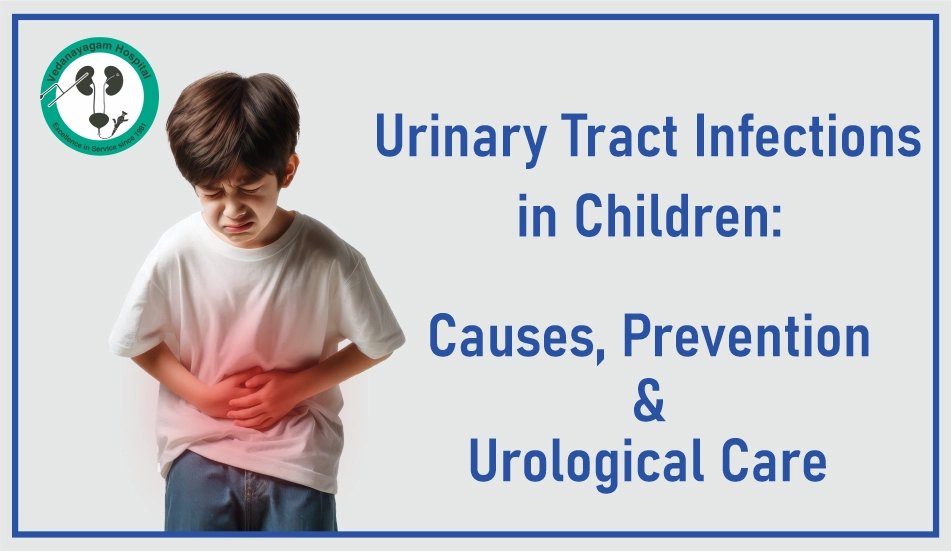Blog summary
Children frequently experience urinary tract infection (UTI), which, left untreated, can lead to health issues. This blog explores the causes of pediatric UTIs, from poor hygiene and constipation to structural abnormalities like vesicoureteral reflux. It highlights early symptoms, diagnosis methods, and the importance of timely antibiotic treatment. Maintaining regular bathroom habits, staying hydrated, and practising good hygiene are emphasized. For recurring or complicated cases, pediatric urological care becomes essential. Early consultation with a urologist helps prevent kidney damage and ensures long-term health. Understanding and addressing UTIs early can protect children’s urinary systems for life.
Table of Contents
Urinary tract infections (UTIs) are common in children and can occur at any age, from infancy through adolescence. Though often considered an adult health issue, UTIs can cause significant discomfort and complications in children if left untreated. Understanding the causes, recognizing symptoms early, and knowing how to prevent and treat pediatric UTIs are crucial steps in ensuring a child’s overall health. This blog offers a comprehensive overview of pediatric UTIs, their root causes, prevention strategies, and the importance of timely urological care.
What is an Urinary Tract Infection (UTI)?
When bacteria, most frequently Escherichia coli (E. coli), enter the urinary system, a urinary tract infection results. In children, UTIs most frequently affect the lower urinary tract, involving the bladder and urethra.
While UTIs are treatable, they can lead to serious complications such as kidney infections (pyelonephritis) or long-term kidney damage if not addressed promptly, especially in younger children.
Common Causes of UTIs in Children
Several factors can lead to the development of UTIs in children. These include:
1. Poor Toilet Hygiene
Children who do not wipe properly, especially girls who wipe from back to front, can transfer bacteria from the anal area to the urethra.
2. Holding Urine for Too Long
Delaying urination increases the risk of infection by allowing bacteria to develop in the urinary tract.
3. Constipation
Urine retention and the growth of bacteria can result from a full bowel pressing against the bladder and interfering with its ability to empty.
4. Urinary Tract Abnormalities
In vesicoureteral reflux, urine flows backwards from the bladder into the kidneys, which is one of the structural abnormalities in the urinary tract that some children are born with. It increases the risk of kidney infections.
5. Uncircumcised Boys
Uncircumcised infant boys may have a higher risk of UTIs, especially in the first year of life, due to bacteria collecting under the foreskin.
6. Infrequent Diaper Changes
In infants and toddlers, prolonged exposure to wet or soiled diapers can facilitate the entry of bacteria into the urinary tract.
Recognizing the Symptoms
Symptoms of UTIs in children vary based on age. Because young children may not be able to express what they’re feeling, parents must stay alert to physical and behavioural changes.
In infants and toddlers, signs may include:
- Fever without an apparent cause
- Irritability or fussiness
- Vomiting or poor feeding
- Unusual-smelling or cloudy urine
- Diarrhea or signs of discomfort while urinating
In older children, symptoms may include:
- Pain or burning during urination
- Frequent need to urinate, even if small amounts expelled
- Bedwetting in a previously dry child
- Abdominal or lower back pain
- Blood in the urine
- Fever and chills
If any of these symptoms occur, especially with a fever, it’s essential to consult a paediatrician or pediatric urologist promptly.
Diagnosis and Testing
If a UTI is suspected, the healthcare provider will typically recommend:
- Urine analysis and culture: This involves collecting a clean urine sample to check for the presence of white blood cells, bacteria, or blood.
- Ultrasound or imaging studies: If a child has recurrent UTIs or is under the age of two, doctors may recommend imaging to check for anatomical issues or urinary reflux.
Proper diagnosis ensures accurate treatment and helps prevent long-term damage to the kidneys or bladder.
Treatment Options
Treatment for pediatric UTIs usually involves:
1. Antibiotics
Oral antibiotics clear the infection.
2. Hydration
Drinking plenty of water helps remove bacteria from the urinary tract.
3. Pain Relief
Over-the-counter medications relieve pain and discomfort during urination.
Most uncomplicated UTIs resolve within a few days of starting antibiotics. However, it’s crucial to complete the entire prescribed course to prevent recurrence.
When to See a Urologist
A pediatric urologist specializes in urinary issues in children. A referral to a urologist is often necessary if:
- The child has recurrent UTIs (two or more within six months)
- UTIs with fever and back pain
- Imaging shows abnormalities in the urinary tract
- There is a family history of kidney problems
- The child has vesicoureteral reflux or other structural conditions
Prevention Strategies
Preventing UTIs in children is possible with a few simple, practical measures:
1. Encourage Good Hygiene
Teach children to wipe front to back and to wash their hands after using the toilet.
2. Promote Regular Bathroom Habits
Encourage children to urinate regularly and not to hold in urine.
3. Treat Constipation Promptly
Regular bowel movements can promote bladder health and lower the risk of urinary tract infections.
4. Increase Fluid Intake
Water removes bacteria from the urinary tract. Kids should be encouraged to stay hydrated throughout the day.
5. Ensure Proper Diapering
For infants and toddlers, change diapers frequently and clean the diaper area properly.
6. Avoid Bubble Baths and Harsh Soaps
These can irritate the urethra and increase susceptibility to urinary tract infections.
The Role of Urological Care
Urological care plays a pivotal role in managing and preventing complex urinary issues in children. Pediatric urologists use a combination of medical, surgical, and behavioural therapies to:
- Identify underlying causes of UTIs
- Address anatomical issues like reflux or blockages
- Guide long-term bladder and kidney health
- Provide education to families for home-based prevention
Working closely with a pediatric urologist ensures that children with recurring or complicated UTIs receive the best care possible.
If your child is showing signs of a urinary tract infection or has experienced recurrent UTIs, don’t wait. Early diagnosis and expert care are key to preventing long-term complications.




